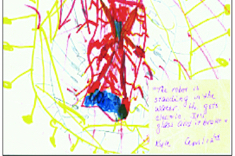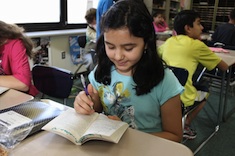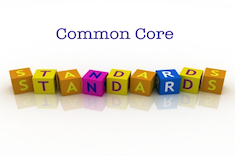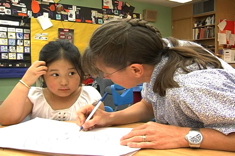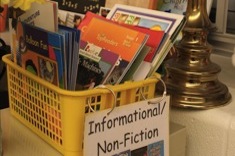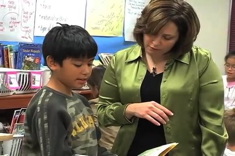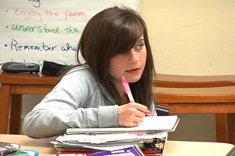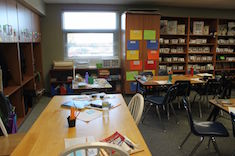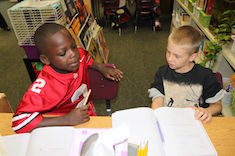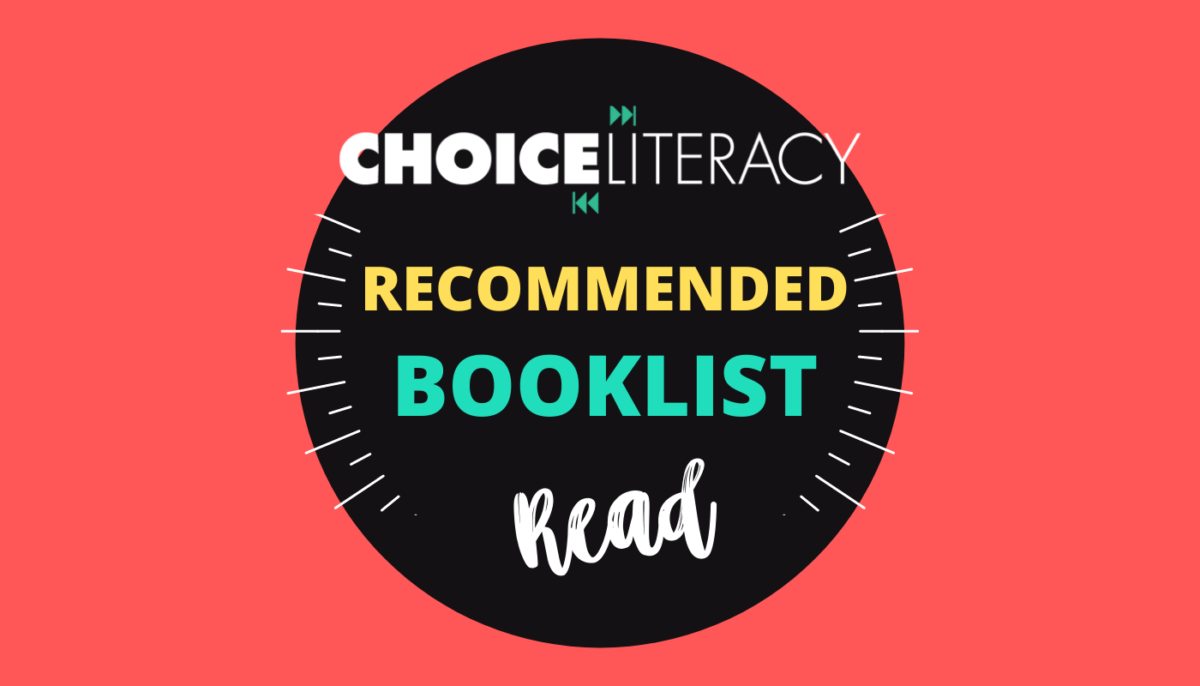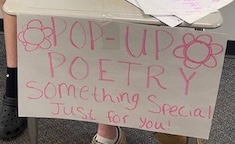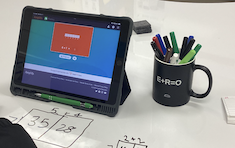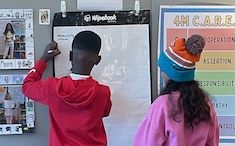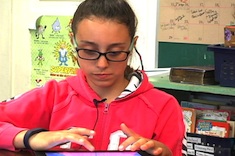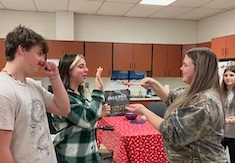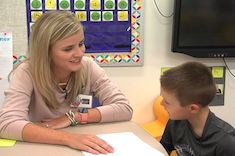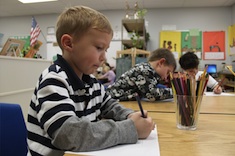Library
Choice Literacy Articles & Videos
The Choice Literacy library contains over 3,000 articles and 900 videos from 150+ contributors. Classic Classroom and Literacy Leadership subscribers have access to the entire library. Content is updated continuously, with five to six new features published each week.
Latest Content
Tracking Young Children’s Writing and Development
Andie Cunningham and Ruth Shagoury share the assessment tools they use to track Andie’s kindergarten writers.
Mentor Texts and Teacher Modeling: The Listing Strategy
In this video from her fourth-grade classroom, Aimee Buckner teaches the “listing” strategy, using the book This Is the Tree: A Story of the Baobab as a mentor text. Aimee talks about mentor texts, using her own writing as a model, and the needs of intermediate readers and writers during the lesson and interview.
Common Core Conversations: Increasing Argumentative Writing
Teachers continue to puzzle over and sort through the terminology in the Common Core related to opinion and persuasive writing. Amanda Adrian and Heather Rader consider terms and teaching strategies.
The Difference Between Conferring and “Touching Base”
Debbie Miller goes against the grain, advocating for “the luscious feeling of endless time” as we slow down to confer with children.
“I Am the Book”: Helping Emergent Bilingual Learners Connect with Books
Jesabel Centeno helps her emergent bilingual learners respond orally to texts and share favorite books with classmates.
Whole Class Interviews: Building Community in Writing Workshop (TEMPLATE)
Interviews early in the year are a potent tool for building a class community.
Word Study is More Than Spelling
Franki Sibberson works to expand her views of spelling and word work, redefining routines in her grades 3 and 4 classroom.
Important Book, Important Notes: Guiding Young Students Through Notetaking
Suzy Kaback catches a young learner near and dear to her in the process of plagiarizing. She uses the experience to develop a template to help students and colleagues with notetaking.
A Strategy Lesson for “Drive-Thru” Readers
Who is a “drive-thru” reader? One who zips through the start of a book and discards it before finishing, moving ever more quickly through random books. Aimee Buckner has some minilesson suggestions for dealing with those students who can’t or won’t finish any books they start.
Teaching About Words, Grammar, and Mechanics Through Children’s Literature (BOOKLIST)
Franki Sibberson wants her students to be more than just good spellers — she wants them to understand words in sophisticated ways, from many different angles. Children's books are a tool for reaching that goal.
Company-Ready Teaching
Mary Lee Hahn prepares for classroom visitors, and the process of viewing her room with fresh eyes makes her question routines and wall displays.
Breathing New Life into the Writer’s Notebook
Tara Smith finds her sixth graders have years of experience with writer's notebooks by the time they reach her classroom. How to inspire enthusiasm for a familiar tool? Mix old favorite tasks and lessons with fresh texts and tech-savvy options.
Choosing Books in Verse
Tara Barnett and Kate Mills offer tips and a booklist to position students to read novels in verse.
Panels and Pages: Using Graphic Novels in the High School Classroom
Gretchen Schroeder bolsters her students’ reading lives and deepens discussion about theme by using the rich graphic novel They Called Us Enemy as a whole-class read with her high school students. Gretchen shows how teachers can support students in deep literary analysis.
Dot Images: Taking Time to Reflect Brings Out Mathematical Ideas
Mallory Messenger shares a way to help students slow down and reflect on mathematical ideas. As she poses dot images to the class and collects different ways students see and count each image, students begin to reflect on key ideas. Mallory gives questions that will help students develop a stronger understanding of the concepts.
Ready-to-Go Book Talks
Leigh Anne Eck shares the dilemma of many teachers—at the start of a new school year, book talks are easy to keep up with because the fresh reads from the summer are front of mind. But as the year gets busy, it becomes more difficult to keep up, and it’s easy to let book talks fall away. Leigh Anne offers a simple and practical solution to have book talks ready no matter how busy or frazzled you are!
Pop-Up Poetry
Inspired by real-life pop-up poets, Gretchen Schroeder designed a similar experience for her high school students. Gretchen outlines the process for preparing and implementing a pop-up poetry event in the halls of your own school. This activity is focused on poetry, but Gretchen thinks it ended up being about squashing your inner critic, trusting your instincts, and leaning into personal connections.
Teaching = Communication
Jodie Bailey reflects on the power and problem of using acronyms to define the order of operations for students. She offers several routines to foster an understanding of mathematical concepts beyond memorizing an acronym.
Giving Kids Time and Space to Show Their Brilliance
Mallory Messenger offers intentional ways to give students time and space to share their learning. This is easier said than done in our fast-paced, standardized-test-driven, mandates-filled world, but with a few intentional strategies, we can slow down the pace just enough to see what our students can really do.
Connection Points: The Sambusa Was the Key
Becca Burk recalls a pivotal moment when a multilingual student brought her sambusas to taste. Let’s remember that connection points—accepting a gift from home, sitting in the struggle, celebrating the small things, and noticing perseverance—are effective because they allow the child to feel seen, included, and celebrated.
Building Community Around Food and Poetry
Gretchen Schroeder creates strong connections with her high school students as they come together as writers around the shared need for and love of food.
Conferring in Kindergarten: Drawing to Learn
Hayley Whitaker confers with a kindergartner and helps him make meaning through drawings.
Gratitude Week
Gigi McAllister shares the tradition of Gratitude Week. It gives students an authentic writing experience that has a ripple effect of spreading joy and gratitude throughout the school. It also shows them the significant impact that their words can have on others.
The Hermit Crab Essay: Finding a Shell to Share a Vulnerable Story
Gretchen Schroeder introduced the hermit crab essay as a creative nonfiction genre to her high school students. What began as an intriguing writing invitation led to realizing that students want to process these events through writing and that the hermit crab essay gives them a way to do so that is less daunting than just a blank page.
Conferring on Inferring in Second Grade
Linda Karamatic works with a student who is reading the Stink series as he tries out a new tool for documenting inferences as he reads.
Use Math Practices to Deepen Friendships
Molly James is inspired by the book Friends Beyond Measure to use math practices to strengthen the bonds of friendship in her kindergarten classroom.
Fake It ‘Til You Make It
Becca Burk tackles the phrase many educators utter—fake it ’til you make it. Becca addresses the reasons why we feel this way, and gives an alternative mindset that is helpful in adopting anchor habits to thrive in today’s classroom.
Going Deeper with Math Curricular Materials
Mallory Messenger guides us in taking what our district-adopted math curriculum resources provide and planning small changes by using problem stems and student problem posing to increase the rigor and make mathematical experiences accessible for all students.
Browse Content By
Type
Category
- Assessment Tools
- Big Fresh Archives
- Booklists
- Choice Numeracy
- Classroom Design
- Common Core
- Community Building
- Conferring
- Content Literacy
- Digital Literacy
- English Language Learners
- Equity
- Family Relations
- Free Samples
- Guiding Groups
- Leadership
- Literacy Coaches
- Mentor Texts
- Minilessons
- New Teacher Mentors
- Podcasts
- Poetry
- Quote Collections
- Reading Strategies
- Self Care
- Struggling and Striving Learners
- Talking and Listening
- Teacher Study Groups
- Teaching Reading
- Teaching Writing
- Word Study and Vocabulary
Author
- Melissa Quimby
- Nawal Qarooni
- Gwen Blumberg
- Julie Cox
- The Lead Learners
- Hannah Tills
- Josie Stewart
- Ruth Metcalfe
- Mallory Messenger
- Becca Burk
- Jodie Bailey
- Vivian Chen
- Mary Brower
- Tiffany Abbott Fuller
- Stephanie Affinito
- Ruth Ayres
- Leigh Anne Eck
- Heather Fisher
- Shari Frost
- Julie Johnson
- Suzy Kaback
- Gigi McAllister
- Shirl McPhillips
- Melanie Meehan
- Cathy Mere
- Debbie Miller
- Tara Barnett and Kate Mills
- Tammy Mulligan
- Dana Murphy
- Bitsy Parks
- David Pittman
- Brenda Power
- Heather Rader
- Matt Renwick
- Mandy Robek
- Christy Rush-Levine
- Gretchen Schroeder
- Jen Schwanke
- Brian Sepe
- Katherine Sokolowski
- Stella Villalba
- Jennifer Vincent
Grade Level
Choice Literacy Membership
Articles
Get full access to all Choice Literacy article content
Videos
Get full access to all Choice Literacy video content
Courses
Access Choice Literacy course curriculum and training

